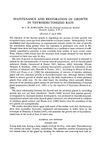 January 2022 in “Clinical Cases in Dermatology”
January 2022 in “Clinical Cases in Dermatology” The document suggests a possible link between hair loss and thyroid cancer, but doesn't provide definite proof.
 8 citations,
March 1942 in “Journal of Endocrinology”
8 citations,
March 1942 in “Journal of Endocrinology” Thyroid hormone treatments help thyroidectomized rats grow normally.
29 citations,
February 1987 in “General and comparative endocrinology” Thyroid and gonadal hormones control seasonal hair growth and molting in male European badgers.
 5 citations,
October 1984 in “The BMJ”
5 citations,
October 1984 in “The BMJ” Up to 50% of scalp hair can be lost before it appears thin, and treatment is only needed for hair loss caused by diseases or deficiencies.
 9 citations,
May 2008 in “Journal of Clinical Oncology”
9 citations,
May 2008 in “Journal of Clinical Oncology” A woman's ovarian tumor causing high testosterone was successfully removed, and her symptoms improved.
 28 citations,
March 1942 in “Journal of Endocrinology”
28 citations,
March 1942 in “Journal of Endocrinology” Male rats grow hair faster than females, and certain hormones can slow or slightly increase hair growth, but not significantly beyond natural rates.
11 citations,
August 2019 in “PubMed” Hirsutism in women is mostly caused by polycystic ovary syndrome and idiopathic hyperandrogenism.
 January 2013 in “Dermatologic Clinics”
January 2013 in “Dermatologic Clinics” Hair disorders need a holistic approach, including medical, cosmetic, and psychological support.
 11 citations,
May 2003 in “Obstetrics and gynecology (New York. 1953. Online)/Obstetrics and gynecology”
11 citations,
May 2003 in “Obstetrics and gynecology (New York. 1953. Online)/Obstetrics and gynecology” Hirsutism in women often indicates a hormonal imbalance and can be managed with a combination of hormonal treatments and hair removal methods.
 1 citations,
November 1998 in “Journal of Small Animal Practice”
1 citations,
November 1998 in “Journal of Small Animal Practice” The dog had a Sertoli cell tumor, which was successfully removed with surgery.
 January 2006 in “Elsevier eBooks”
January 2006 in “Elsevier eBooks” Cats with Feline Symmetrical Alopecia can regrow hair with proper treatment based on the specific cause, including diet, medication, or stress management.
 6 citations,
April 2018 in “Obstetrics, gynaecology and reproductive medicine”
6 citations,
April 2018 in “Obstetrics, gynaecology and reproductive medicine” Most women with hirsutism have it because of PCOS, and they need long-term treatment including medication and hair removal to improve their condition.
 4 citations,
December 2018 in “Case reports in endocrinology”
4 citations,
December 2018 in “Case reports in endocrinology” A 63-year-old woman's male-like symptoms were caused by a rare testosterone-producing ovarian tumor, treated by removing her ovaries and fallopian tubes.
 14 citations,
March 2010 in “Gynecological endocrinology”
14 citations,
March 2010 in “Gynecological endocrinology” New treatments for excessive hair growth in women include insulin modulators and enzyme inhibitors.
 2 citations,
June 1980 in “International Journal of Dermatology”
2 citations,
June 1980 in “International Journal of Dermatology” Scalp biopsies are important for diagnosing hair loss conditions.
 12 citations,
April 2014 in “Facial Plastic Surgery Clinics of North America”
12 citations,
April 2014 in “Facial Plastic Surgery Clinics of North America” Direct excision techniques can rejuvenate the neck but may not enhance the jawline and could cause neck-face disharmony if done incorrectly.
3 citations,
February 2013 in “Actas dermo-sifiliográficas/Actas dermo-sifiliográficas” A 6-year-old boy developed excessive hair growth after taking diazoxide for low blood sugar.
 3 citations,
April 2019 in “Journal of psychosexual health”
3 citations,
April 2019 in “Journal of psychosexual health” Women with PCOS often have sexual problems, and treating these issues early can improve satisfaction and reduce healthcare costs.
 6 citations,
July 2003 in “Journal of Womens Health”
6 citations,
July 2003 in “Journal of Womens Health” Experts say proper treatment and sensitivity are important for women's facial skin issues like acne and unwanted hair.
 48 citations,
March 1997 in “Veterinary Dermatology”
48 citations,
March 1997 in “Veterinary Dermatology” Some cats with sudden hair loss and tiredness might have cancer-related alopecia.
 12 citations,
May 2005 in “Current obstetrics and gynaecology/Current obstetrics & gynaecology”
12 citations,
May 2005 in “Current obstetrics and gynaecology/Current obstetrics & gynaecology” Hirsutism is too much hair growth in women like the pattern in men, often caused by high male hormones, and can be treated with hormone control and hair removal methods.
 35 citations,
February 2012 in “The New England Journal of Medicine”
35 citations,
February 2012 in “The New England Journal of Medicine” Early diagnosis and treatment of TPP can prevent complications.
 7 citations,
October 2012 in “S. Karger AG eBooks”
7 citations,
October 2012 in “S. Karger AG eBooks” Some conditions mimic PCOS symptoms and need careful diagnosis to treat potentially serious health issues.
July 1998 in “Annals of saudi medicine/Annals of Saudi medicine” A misdiagnosed case of HAIR-AN syndrome led to unnecessary surgeries and highlighted the importance of correct diagnosis and treatment.
 195 citations,
May 2003 in “Obstetrics and gynecology (New York. 1953. Online)/Obstetrics and gynecology”
195 citations,
May 2003 in “Obstetrics and gynecology (New York. 1953. Online)/Obstetrics and gynecology” Most women with excess hair growth have an underlying hormonal issue, often treated with medication and hair removal methods.
 December 2013 in “Macedonian Journal of Medical Sciences”
December 2013 in “Macedonian Journal of Medical Sciences” Ovarian steroid cell tumors should be considered in adults with hirsutism and high testosterone, with surgery as the main treatment.
 April 2024 in “International Journal of Women’s Dermatology”
April 2024 in “International Journal of Women’s Dermatology” Laser hair reduction can sometimes cause a rare skin condition called Fox-Fordyce disease.
 4 citations,
January 2019 in “Obstetrics & gynecology science”
4 citations,
January 2019 in “Obstetrics & gynecology science” A PET-CT scan successfully located a hard-to-find Leydig cell tumor in a woman with hormonal symptoms.
 April 2023 in “Clinical Chemistry and Laboratory Medicine”
April 2023 in “Clinical Chemistry and Laboratory Medicine” The document concludes that inflammation markers can be used in diabetes, vitamin D3 affects immune pathways, hyperthyroidism changes hormone levels, androgen levels help diagnose Adrenocortical Carcinoma, erectile dysfunction is linked to diabetes, hypogonadism is common in HIV-infected males, and hormones can be biomarkers for various conditions.
 85 citations,
May 2019 in “Journal of neuroendocrinology”
85 citations,
May 2019 in “Journal of neuroendocrinology” The article concludes that better understanding gene regulation related to seasonal changes can offer insights into the mechanisms of seasonal timing in mammals.


























